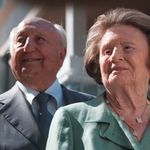Perelman Professorship of Neuroscience II
 In 2011, Ray and Ruth Perelman made a historic gift to permanently endow Penn’s medical school, which was renamed the Raymond and Ruth Perelman School of Medicine at the University of Pennsylvania. From the endowment funds, Perelman Professorships were created to recognize faculty members who are making a transformative impact on academic medicine. Perelman Professorships are awarded to both current Penn professors and new faculty recruited from around the world.
In 2011, Ray and Ruth Perelman made a historic gift to permanently endow Penn’s medical school, which was renamed the Raymond and Ruth Perelman School of Medicine at the University of Pennsylvania. From the endowment funds, Perelman Professorships were created to recognize faculty members who are making a transformative impact on academic medicine. Perelman Professorships are awarded to both current Penn professors and new faculty recruited from around the world.
The Perelmans’ endowment of the medical school followed the couple’s earlier naming gift for the Ruth and Raymond Perelman Center for Advanced Medicine, Penn Medicine’s state-of-the-art outpatient center. Through their philanthropy, the Perelmans became crucial partners in making Penn Medicine one of the most influential and innovative academic medical centers in the U.S.
Raymond G. Perelman (1917–2019) was the Founder, Chairman, and CEO of RGP Holdings, a private holding company comprising an array of manufacturing, mining, and financial interests. He and Ruth Caplan Perelman (1921– 2011) were married for 70 years. The Perelmans were counted among Philadelphia’s most prominent and generous philanthropists. They made pathbreaking gifts to the Philadelphia Museum of Art and its adjacent Perelman Building, the Kimmel Center and Perelman Theater, the Perelman Jewish Day School, and many other Jewish cultural and welfare organizations. Both the Children’s Hospital of Philadelphia and Drexel University have honored Ray’s extraordinary support by naming areas of their campuses in his honor.
At Penn, Mr. Perelman became a powerful advocate for all of Penn Medicine’s missions. In his later years, he could often be seen on campus or at medical school events such as graduation and the celebration of the Perelman School of Medicine’s 250th year. He particularly enjoyed meeting Penn’s incoming medical students.
A Wharton alumnus and recipient of an Honorary Doctor of Laws degree from Penn, he served as a Penn Medicine Trustee from 2002 to 2012. In 2011, he was awarded Penn’s Medal for Distinguished Achievement, one of the University’s highest honors, to recognize “his untiring efforts and immeasurable contributions to the health and well-being, education and cultural opportunities in Philadelphia and beyond.”
Current Chairholder
The Perelman Professorship of Neuroscience II is currently open.
Previous Chairholder
Hongjung Song, PhD 2017-2025

